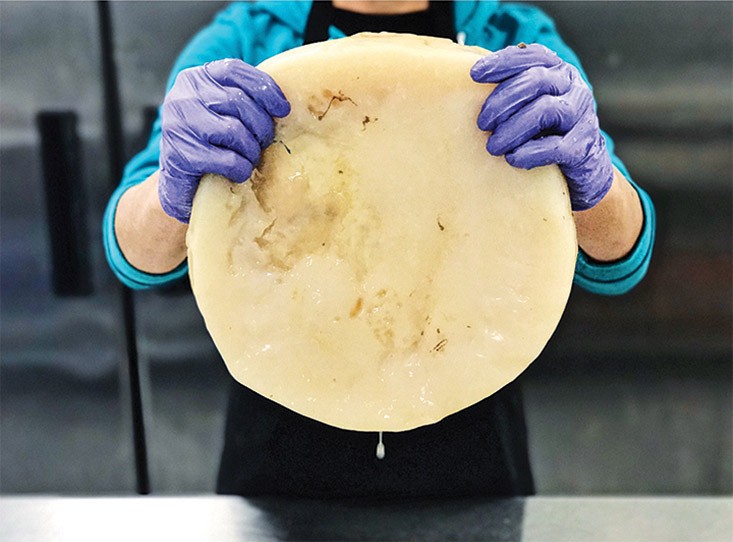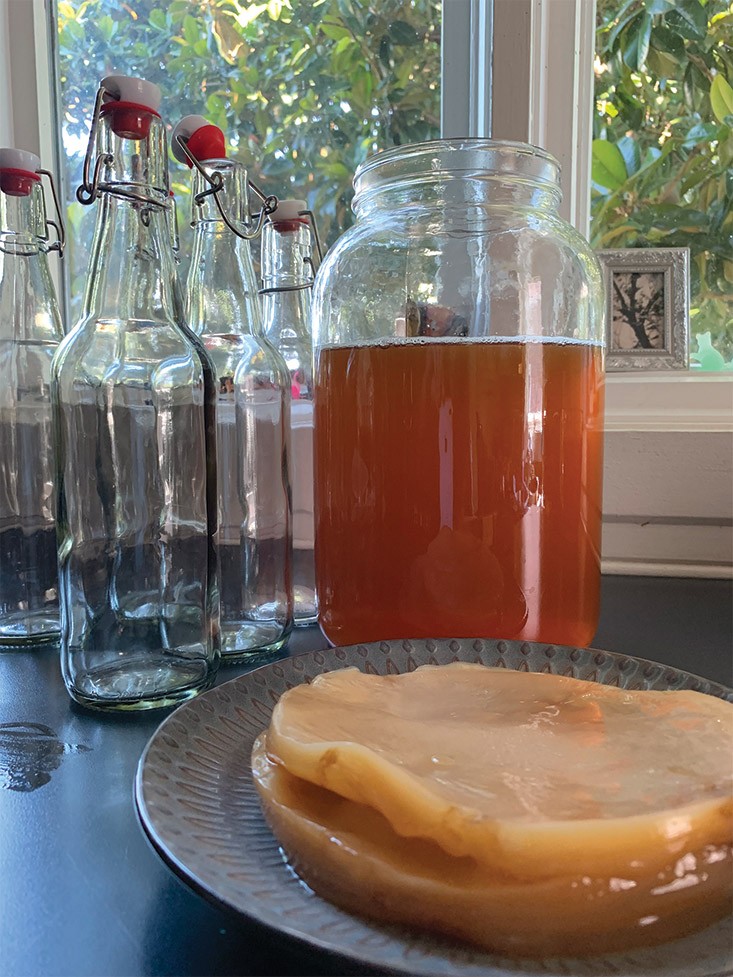From a distance, the sleek silver and black tap handles that read ELIXIR in a sharp font seamlessly blend in at Naïve’s craft beer bar. A closer look shows these taps aren’t pumping out a local beer but rather a much less alcoholic yet similarly fermented beverage: kombucha.
“It’s really good for gut health,” owner Catherine MacDowell said. “And it’s a super light and refreshing drink. It’s like a nonalcoholic version of champagne,” she said with a laugh.
Kombucha is made from sweet black or green tea and loads of friendly yeast and bacteria known as the SCOBY, an acronym for Symbiotic Colony of Bacteria and Yeast. (Some people call that part the “snot.”)
Once obscure, many kombucha brands are popping up on supermarket shelves and in restaurants, and increasingly home-brew versions can be found in the closets or garages of DIY drinkers. In 2018, the kombucha market was estimated to be worth over $412 million, growing 42% from 2017 according to Nielsen. And amidst this fad, Elixir Kombucha has been making and selling its brew in Louisville since 2016.
“Many people are gravitating toward healthier options when it comes to food and beverage,” Corey Wood, one of three founders of Elixir Kombucha said. “Some folks say kombucha is an acquired taste, but once you acquire it, your body will crave it.”
Despite the seemingly recent boom, historians and scientists date the origin of kombucha to 220 B.C. in the Manchurian region of China. Hopping along trade routes and eventually spreading through Eastern and Western Europe, its popularity has been traced from fifth century Japanese Imperial Courts to Russian babushkas during the Soviet era. And along the way, it has gained traction for more than just its fizz and somewhat vinegary flavor, but also, for its supposed health benefits.
While many drinkers tout the beverage for its healthy bacteria, which can aid digestion, others go beyond the probiotic praise. Some claim it can help prevent cancer or heart disease, but science has yet to support such claims.
And, as hardcore drinkers find more affordable ways to get their fix by acquiring SCOBYs and brewing it themselves, experts emphasize the importance of following strict hygiene rules — or else less-friendly, even dangerous bacteria could find their way into the brew.
Its relatively recent blossoming as a multimillion-dollar industry has led to questions on how the fermented drink is regulated. It is categorized as a “specialized process” by the Food and Drug Administration and must adhere to certain rules from the Alcohol and Tobacco Tax and Trade Bureau. But how do you keep a product that continues to slowly ferment — even in the refrigerated section of a grocery store — below legal thresholds of alcohol levels?
Health or Hype?
Kombucha’s claim to fame is its high probiotic content. The good-for-you bacteria and yeast is found in most fermented foods, which is why yogurt, sauerkraut, tempeh and kefir are celebrated as a boost to gut health.Kombucha’s source of probiotics comes from the SCOBY. The bacteria-yeast combo creates a slimy disc that floats to the top of the brew and becomes the starter for future batches. As it lives in the sweet tea, it consumes most of the sugars and caffeine, letting the yeast and bacteria flourish and repopulate. Wood called it “the life force” of kombucha.
Made of cellulose, it’s the center for all of the bacteria and yeast in the drink itself. You could say it’s just kombucha in solid form.
The kombucha “mother,” or “snot,” has a reputation for scaring people away from the brewing process. The beige circle forms in layers, it has a texture that slips out of your hands like an amphibious swamp creature and, when suspended in the translucent tea, it seems like something that belongs on a science lab’s shelf.
Before Elixir was a business, the founders’ friends poked fun at their SCOBY, calling their batch of kombucha “that science experiment with the weird blob.” Yet, despite its easy-to-make-fun-of appearance and texture, it’s exactly the SCOBY’s resident probiotics that have helped make kombucha so popular.
Sara Police, professor of nutritional sciences at UK, said trillions of bacteria live in the human body, known collectively as the microbiome. Research suggests that the microbiome plays a role in weight loss and gain, fighting illnesses, mental health and mood cognition.
“One rationale for probiotics to have beneficial health effects lies in the assumption that probiotics can infiltrate and/or manipulate the microbiome in a positive way,” she said.
Some take kombucha’s remedy potential a step further, claiming it can fight against diseases such as cancer, heart disease or diabetes. This is not supported by research, so far. Research is in the early stages and not yet conclusive, said Heather Hallen-Adams, an assistant professor in the food science department of the University of Nebraska-Lincoln.
“This is not to say kombucha is bad, or even ineffective, but we do not have data to support specific beneficial effects in humans,” she said.
Paul Haney, one of the founders of Kentucky Kombucha in Springfield, Kentucky, said he believes kombucha helps the body maintain equilibrium, but “kombucha is not a curative; it does not cure anything.”
And then there are the anecdotal reports.
Luanne Hardin, a 28-year-old drinker from Middletown, has been a fan of kombucha since 2015. She drinks 16-ounce servings three to four times a week, buying bottles of Elixir or the national brand GT’s. “I feel more energized and overall a sense of wellbeing because I’m nourishing my body,”she explained.
Mary Yates, a 50-year-old Louisville homebrewer and drinker, said she was first interested in the beverage for its claimed health benefits. She’s been brewing it on and off for 15 to 20 years. As someone who has had gut-related problems throughout her life, she said that kombucha — and probiotics at large — have helped her feel better.
Similarly, she said her husband has felt the effects of her homebrew in as little as one hour when his gut feels upset. “For something that works that well that’s not some pharmaceutical, it is really nice.”
“It could be a placebo,” Yates said with a laugh, but she believes that current research on the drink speaks for itself.
MacDowell said one of the main reasons Naïve decided to stock kombucha was to offer healthier alternatives to artificially sweetened sodas. And she said that guests who might have otherwise ordered a Coke or Sprite find themselves reaching for kombucha instead.
“That’s why we’re here,” MacDowell said. “To open the conversation up [on healthy choices], maybe you can have a healthier, alternative beverage when you go out and you don’t have to grab [a soda] that has a ton of artificial sweeteners in it.”
Kentucky’s connection
The team at Elixir never intended to launch its personal kombucha brewing into a business. They had shared bottles with friends and family, but apparently word travels fast in Louisville’s health community. Through mutual connections, The Weekly Juicery got an Elixir sample and wanted in, sending a purchase order.No one had a business background, so first, the trio had to find out what a purchase order actually is.
By 2016, national and semi-local brands were a mainstay at specialty grocers in Louisville, although the city itself wasn’t yet home to its own kombucha company. Now, Elixir produces about 6,000 bottles per month. Wood said they still hand label, fill and cap each one.
“There was no master plan from the start,” Wood said. “We were three people with a love for kombucha and realized our city didn’t have a local option.”
Sixty miles away, Kentucky Kombucha has been brewing and selling its long-necked bottles of booch since 2013 in Louisville at farmer’s markets and in stores.
Haney and Alison Baker, Kentucky Kombucha’s founders, didn’t intend to sell their probiotic brew when they started making it for themselves, either. They grew organic fruits and vegetables on their farm and sold them weekly at the Douglass Loop Farmers Market. On a delivery one day, Haney was craving kombucha. Searching the grocery store for a bottle, he couldn’t find any. “Surely in a state known for brewing and distilling, there was a commercial producer?” he thought.
Nope.
Haney at first didn’t give it much thought. He just made sure to keep the homebrew near for when the craving struck again, and when it did, he had a Eureka moment. Haney was harvesting on the farm on a hot day and turned to the tea for some extra hydration. Baker brought him a mason jar full of their homebrew, “I took a drink, and I literally stopped in my tracks. It was that good,” he said. Haney realized that he and Baker could be that local brand that he had searched for in the grocery store.
They tinkered with the recipe and bottling process and, soon, their fermented tea joined the fresh fruit and vegetables at the farmers market. By the third year, it was so successful that kombucha took over the entire booth.
“Commercial brewing is like farming, but instead of farming crops, we are farming microbes,” Haney said. “Just like adding fertilizer to the soil, or the right amount of water, so too does the brewer have to optimize the environment for the bacteria and yeast to thrive.”
The couple has moved to Maui, so the company is in transition to new management: Dominique and John Shrader, who are also behind the Noble Funk Brewing planned in the old Kroger building on South Second Street.
Commercial brewers are also based in Lexington and Bowling Green. A grocery manager for Rainbow Blossom said its stores sell on average 3,500 bottles per month. Even Kroger offers various brands, and Cotsco sells it by the box load.
There is alcohol in it?
In 2010, an inspector from the Department of Agriculture, Conservation and Forestry in Maine noticed some bottles of kombucha were bubbling over on store shelves at a Whole Foods in Portland. To check if the drinks were still fermenting, the department ran tests on several brands and GT’s, the industry leader in kombucha with an estimated 60% hold on the market, was found to have alcohol by volume, or ABV, of up to 2.5%.Alcohol is a byproduct of fermentation, and beverages deemed nonalcoholic, such as kombucha, are required by the U.S. Alcohol and Tobacco Tax and Trade Bureau, or TTB, to remain under .5% ABV to qualify as such.
Whole Foods swiftly pulled all kombucha from its shelves nationally. And GT’s faced class action lawsuits from upset consumers. In an interview with kombuchakamp.com, GT Dave said at the time, “We are looking at every single aspect of the production to remove any likeliness that this will occur again.”
In a California case, Kombucha Dog, a company whose drink ABV is above .5%, filed a complaint against big kombucha brands, claiming those products exceeded the nonalcoholic beverage maximum. This particular case challenged the nonalcoholic claims as a violation of the Lanham Act, which prohibits unfair competition, because Kombucha Dog had to sell its product alongside alcoholic drinks, while the other brands did not, despite having similar ABVs. Attorney and Louisville native Stephen Weisskopf, who represents Kombucha Dog, said the case was brought to address a business concern, but “we were obviously very concerned with the health issues and the companies not being responsible.”
Unadvertised alcohol contents could pose risks to children, people with health problems and recovering alcoholics. The federal government regulates kombucha, but mostly from a tax perspective and does not check alcohol content before the drink is put on the market. It is up to the kombucha brewers with ABVs above .5% to register as “dealers in alcohol beverages,” according to the TTB. On its website, TTB recommends that to avoid labeling and tax penalties, producers should test alcohol content to ensure it doesn’t exceed mandated levels during or after bottling.
“The industry right now is totally self-regulated,” Weisskopf said.
Kombucha Brewers International, a trade association, says it is working with its members to prevent another incident involving overly alcoholic kombucha, which it claims lost the industry millions of dollars.
It has also lobbied Congress to support the “Keeping Our Manufacturers from Being Unfairly taxed while Championing Health Act” aka the KOMBUCHA Act, which seeks to raise the legal ABV of kombucha to 1.25% (for comparison, an average beer has 4 to 5% ABV) and exempt kombucha from an excise tax imposed on alcoholic beverages.
For Elixir, it is easier to keep ABV at the required limit because of its relatively small operation. But as it expands, it could face challenges. Wood said the proposed legislation would allow producers to make “authentic kombucha” without worrying as much about exceeding the required ABV.

Make Booch, Be Careful
Whether it’s due to skepticism around store-bought brands, wanting to save money or a need for a new hobby, people are turning to making their own kombucha.Before the 1990s, homebrewing kombucha, or knowing someone with a homebrew, was virtually the only way to get the drink.
Haney recalled the homebrew his mother made. “My mother made kombucha in the ‘70s. It was a popular hippie thing at the time,” he said. “It was always around. That is, until disco. No kidding. We lost more than good music in my home — we lost kombucha.”
Yates also was introduced to it through her bohemian connections. Spending weekends on the farm of her “hippie friends,” she learned about homebrewing.
A photographer by trade, she found it easy to apply her uber-clean dark room habits to homebrewing, which experts say is important for safety.
One recent day, she took a look at the orange-ish colored kombucha and its SCOBY sitting in a mason jar. Stringy, dark-colored flecks were sifting around. “This is the yeast falling out of suspension,” she said, speaking almost like a scientist examining a petri dish under a microscope. “That’s not mold, that’s the yeast dying and moving into [the kombucha].”
Brewing kombucha is relatively easy. All you need is black or green tea, sugar, starter liquid and of course, the SCOBY. Depending on the size of your jar, most kombucha batches will be ready in seven to 14 days, and then you can bottle it for carbonation and flavor it with fruit juice or just about any flavor combination.
When prepared in sterile environments, homebrewed kombucha rarely poses risks to drinkers, but dangerous airborne yeasts and bacteria can infect the brew and, if not properly identified, pose serious health effects.
“Risks in [food/drink fermentation] are related to quality of the raw material and deviation from optimal fermentation conditions,” said Police, the professor of Nutritional Sciences at the UK. “Either of these factors could increase risk for pathogens development or production of toxic compounds.”
Hallen-Adams, the assistant professor at the University of Nebraska-Lincoln, recommended getting the SCOBY from a reliable source to ensure its resistant to dangerous bacteria. “A greater concern would be mold,” she said. “Some molds can produce toxins.”
As homebrewing becomes an increasingly popular fermentation-based hobby, countless online resources help guide brewers. A Reddit-based kombucha forum is home to as many pictures of successful batches as concerned users double-checking that no mold is forming on their SCOBY.
But when the conditions cooperate and the batch stays free of dangerous infectants, the reward is more than just the probiotics, but for some, a creative outlet. Yates said the options are endless when it comes to flavoring the brew in the second fermentation stage.
Even Corey Wood continues to keep a homebrew, “It’s a fun hobby and a way to get creative with new flavors,” he said.
Still, even flavoring won’t make it everyone’s cup of tea.
Luanne Hardin was recently drinking one of her favorite flavors, ‘watermelon wonder’ from GT’s, which she thinks tastes just like a jolly rancher. But her fiancé had other thoughts. When he tried it, he thought it tasted like vinegar.
“I wish I had a reaction of his face,” she said. He hasn’t tried it since, and Hardin joked that now he won’t trust her on any health food/drink she recommends. •







